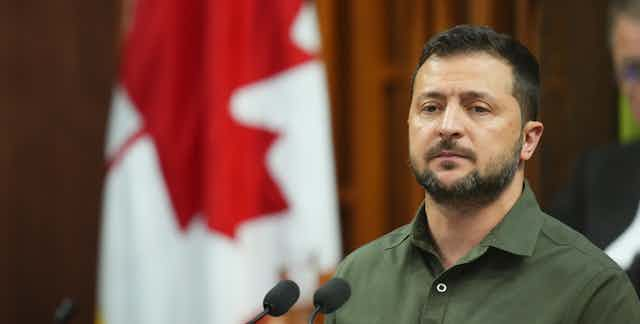Ukrainian President Volodymyr Zelenskyy has capped off a visit to North America with a stop in Ottawa, where he addressed Parliament and urged the world not to forget about the war in Ukraine.
“It is genocide what Russian occupiers are doing to Ukraine,” he said.
“And when we want to win — when we call on the world to support us — it is not just about an ordinary conflict. It is about saving lives of millions of people.”
Zelenskyy’s stop in Canada, a steadfast Ukrainian ally, came after a meeting with U.S. President Joe Biden at the White House and a speech to the United Nations in New York. It was his first visit to Canada since Russia invaded Ukraine in February 2022.
This North American tour has taken place as the war in Ukraine shows no signs of abating. The hopes of Ukraine and its allies that either sanctions or the Ukrainian summer offensive would bring a rapid end to the war have not come to pass.
With the approaching winter likely to halt Ukraine’s counteroffensive just as it’s starting to make gains, both Ukraine and Russia must focus on winning the long war versus triumphing in immediate battles.

For both countries, the support of other states in the international community is crucial. In recent months, Russia has courted support from Africa, hosting the Russia-Africa Summit in July, and Russian President Vladimir Putin recently met with North Korean General Secretary Kim Jong Un in Russia’s Far East.
Russia is making this outreach as Ukraine receives significant support and aid from the U.S. and its allies. This help can’t be taken for granted, however. Domestic pressures, particularly in the U.S., pose serious risks to this continuing aid.
Solidifying support is necessary for Ukraine to continue its resistance against Russian aggression. That’s why Zelenskyy has been seeking support in both the U.S. and Canada.

The myth of quick, decisive battles
Ukraine’s armed forces have performed admirably in the conflict. As the war approaches its third year, it’s easy to forget that many outside observers, and likely Russians themselves, expected Ukraine to quickly fall in February 2022.
The fact that Russia has so far failed to defeat Ukraine is a testament to the skill and capabilities of the Ukrainian military.
That performance, however, has created misplaced expectations. Western military officials emphasize the importance of quick and decisive battles to achieve victory. The U.S. embodies this conviction, and the belief is so ingrained that policy analysts have attempted to determine how best to avoid the “long war.”
Not only is the belief flawed, it creates expectations that undermine the West’s support of Ukraine.
Nowhere has this problem of misplaced expectations been more evident than in Ukraine’s recent summer offensive. Its success in defeating Russian forces in several battles during the summer and fall of 2022 created expectations that did not match reality.
Read more: Ukraine recap: counter-offensive gathers pace while Wagner Group takes on new role
Not only were the Ukrainian forces not suited for the type of offensive operations expected this past summer, but Russian forces had reconstituted themselves in the aftermath of the disastrous early months of the invasion.
Wars, however, are rarely won in one battle. NATO Secretary General Jens Stoltenberg recently warned that Ukraine’s supporters need to recognize that the war in Ukraine will not have a quick end. In protracted wars, mobilizing resources and maintaining morale have greater significance than any individual battle.

Waning support?
For both these factors, external support is crucial to Ukraine’s ongoing ability to wage war.
One advantage Ukraine has possessed since the outset of the war is the superior morale of both its armed forces and on the home front. The other is unprecedented material support from its allies. Neither of these factors are fixed and can shift over the course of a war.
The recent G20 summit in India demonstrates the problems Ukraine faces over the long term.
At the G20 summit in Indonesia a year earlier, member countries agreed to condemn Russia’s invasion of Ukraine in “the strongest terms.” The 2023 declaration, however, spoke in general terms without an explicit condemnation of Russian aggression.
Ukraine and its supporters were incensed at this development, but it wasn’t an unexpected one.
The presumption in the West that the world stands with Ukraine is misplaced; many countries in the Global South are either neutral or actively support Russia.
With India maintaining ostensible neutrality in the Russia-Ukraine war, and western states viewing India as an offsetting power to China, Ukraine’s priorities were sacrificed for this other objective.
Preparing for the long war
While Ukraine’s survival is important to western policymakers, the G20 shows it’s just one priority among several. The longer the war lasts, the more likely other priorities may supersede or even replace it among Ukraine’s allies.
Poland’s decision to halt sending arms to Ukraine demonstrates this trend.
Read more: Ukraine's push for NATO membership is rooted in its European past – and its future
This means Ukraine and its supporters must adapt to the long war.
First, the support the West and its supporters are providing to Ukraine needs to be adapted to meet Ukrainian needs.
While Ukraine’s supporters have been generous with material support in many areas, force multipliers that will help the Ukrainian military get more done with less expense are required. That includes artillery shells and engineering assets, which have largely been neglected by the West.
In order to obtain the supplies that it urgently needs, Zelenskyy needs to shore up political good will among Ukraine’s allies.

